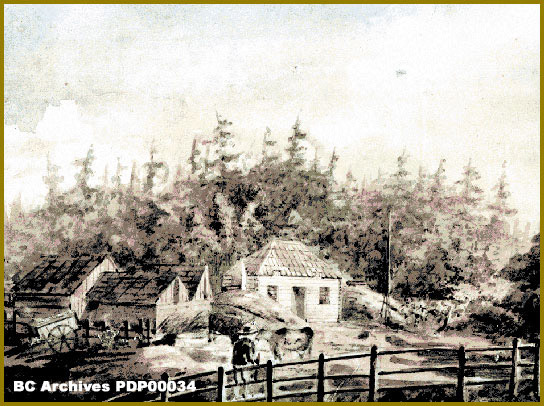
 |
| Captain W.C. Grant's Sooke Estate |
Grant was the first European not connected with the Hudson's Bay Company (HBC) to take up land on the island and he did so with high hopes:
he brought with him articles of every description which he thought to be necessary for an emigrant. Needless to say, the great majority of the articles were of no earthly use; sets of carriage harness, there being no carriages nor suitable horses, and similar useless articles of all descriptions.3However, not all of Grant's equipment was considered useless. "The cricket sets he brought and presented to the school... proved to be most acceptable and we unanimously voted Captain Grant a fine fellow."4 Although the colony at first appeared agreeable to Grant, his hopes of living the life of a country squire were soon dashed. The colony's natural beauty did not offset its lack of amenities. Even worse, Grant found that the HBC had reserved the best of the region's agricultural land for its own use. Grant eventually decided to leave Mullachard, the estate that he had carved out of the Sooke wilderness, and return to England. When Grant left Vancouver Island in 1853, Victoria still consisted of little more than a "handful of warehouses."5
Grant's failure was viewed by some as a strike against the Wakefield system. The system drew much criticism as it was seen to restrict investment and thereby hamper growth. Opponents of the system demanded access to land without minimum purchase restrictions, one of the corner-stones of the policy imposed by the officials at the Colonial Office. Despite Grant's inability to maintain a fantasy life-style on the frontier, some British institutions were making inroads in the colony. As the naval base at Esquimalt grew into an important station, Victoria found in Her Majesty's sailors, perhaps ironically, some of the stability that the Colonial Office had hoped the likes of Grant would provide. During the late 1850's and early 1860's though, Victoria would have seemed anything but stable as the lure of gold drew thousands of men through Victoria on their way to interior diggings. Captain Walter Colquhoun Grant's stay on Vancouver Island was brief, but in certain ways, his presence can be felt to this day:
the broom - which Grant planted at Mullachard to remind him of Scotland - is now found throughout the island. And then there is cricket ... Like the flowering shrub, the gentlemanly game ... took firm root on the island and has flourished there ever since.6